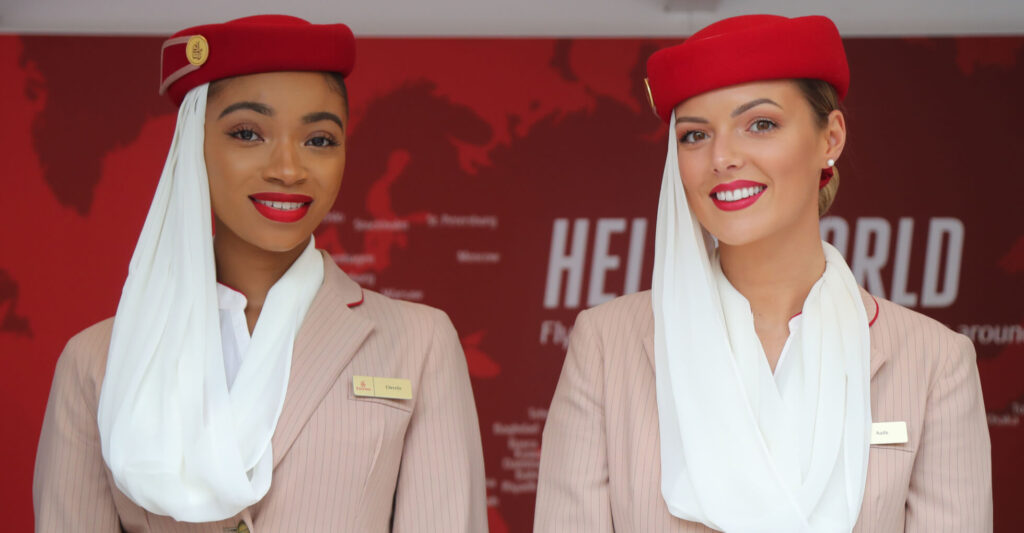Nowadays, a flight attendant is a person on-board who serves passengers and makes sure they follow the safety rules. Through years, flight attendants faced job requirements that sound pretty unbelievable today., ranging from no-marriage rules to exotic uniforms and specific body weight.
It took many years to go from ‘stewardesses’ to flight attendants and even more legal anti-sexism actions to create a non-discriminatory working environment on-board. The story of flight attendants shows a beautiful journey of many generations that fought to create what today we can call a real flight attendant.
Young, beautiful and not married
Back in the 1950s, ‘stewardesses’ usually started their careers at the age of 18-20. Ordinally, they began working on-board just straight after high school. Through the period of the 1950s and 1960s, the average age of ‘stewardesses’ was between 32 and 35 years old.
Also, a marriage could mean disqualification for a young ‘stewardess’ candidate. Even though the ‘no-marriage’ rule was slightly relaxed in 1957, most airlines still required female flight attendants to be single and, of course, not pregnant.
Marriage is fine! Bring up the fashion
In the late 1960s, airlines finally accepted the idea of married flight attendants. Paradoxically, one of the world’s largest airlines – United Airlines released an ad saying – ‘Marriage is fine! But shouldn’t you see the world first?’
Also, flight attendants experienced the real fashion shift of their uniforms. One noteworthy example was Braniff International uniforms, designed by Emilio Pucci, a well-known Italian fashion designer. The period of the 1960s was the beginning of elegant, glamour, and fashionable flight attendants’ era.
Facing the sexism
Within years, airlines became more open to married and pregnant flight attendants, yet it did not abandon the inherent sexism, and this for both genders.
50 years ago, female flight attendants were expected to wear more provocative clothing such as tight blouses and mini skirts. ‘Stewardesses’ were forced to retire between 28 and 35 years old. 1972 marked history after a group of women started an organization – Stewardesses for women’s Rights (SFWR). Through strikes, they protested against discrimination based on gender, appearance, and age.
Sexism also affected male flight attendants as they had a lower chance to get a job on-board because of their gender and marriage status. In 1971, a young married man and father of two,Celio Diaz, won a case in Supreme Court against Pan American World Airways that refused to hire him because of said reasons.
From stewardesses to flight attendants
After Diaz’s success in the Supreme Court, airlines officially stopped using the word ‘stewardesses’ and replaced it to a flight attendant. The change was made in order to support the gender neutrality of the flight attendants. Notably, this action led to the massive recruitment of male flight attendants in the 1980s.
9/11 transformed the work on-board forever
After the tragedy of 9/11, the job of flight attendants changed completely. It affected their primary training, with flight attendants taught to check and recognize any suspicious action of passengers on-board. Some were even trained in martial arts such as Karate.
Sorrowfully, many flight attendants experienced and suffered from post-traumatic stress disorder (PTSD) after the 9/11 attacks, according to the National Institute of Health. Over 18% of American Airlines (A1G) (AAL) flight attendants reported PTSD symptoms after the terrorist attack according to the case studies of the National Center of Biotechnology Information.
Maturity and conservative appearance
Nowadays, the uniform of flight attendants is more conservative and classy. There is no expectation to show beautiful legs or put a lot of makeup while working on-board. Now, airlines focus more on the communication and leadership skills of flight attendants rather than appearance. Without saying, a clean and neat look of flight attendants is a must.
Since the 1980s, the average age of flight attendants grew from 35-year to 46-year.

